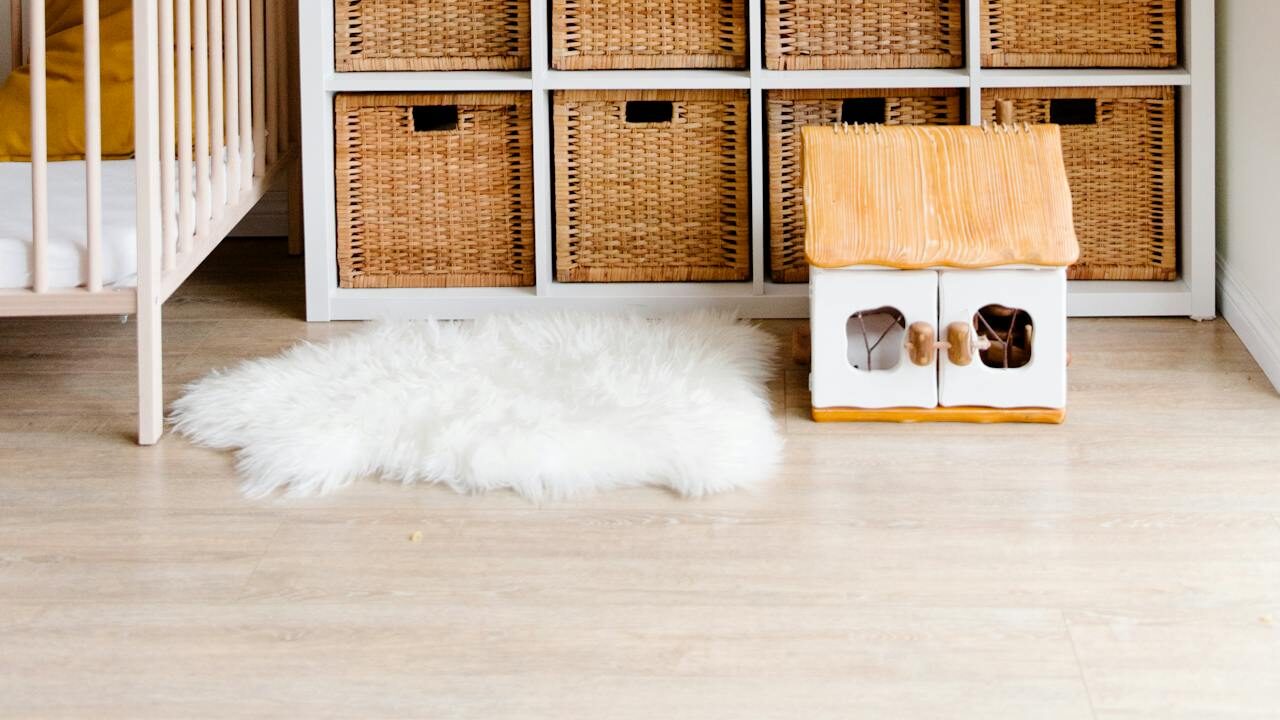Introduction:
Epoxy floors remain a versatile and practical choice for residential and commercial spaces. Here we will share the five main advantages of epoxy floors in detail. Their popularity continues to grow due to the many benefits they offer. In this article, we’ll explore five main advantages of epoxy floors that make them most preferred in the interior design and construction industries.
Table of Contents
1. Epoxy floors are Durable
Epoxy floors are durable, making them a go-to choice for spaces that undergo heavy use and frequent wear. Comprised of multiple layers of epoxy resin, these floors form an incredibly resilient surface that can withstand the toughest conditions. Whether it’s the daily foot traffic in a bustling retail store, the constant movement of heavy machinery in an industrial facility, or the occasional mishap in a busy household, these floors hold up admirably against all challenges.
The secret to their durability lies in the chemical bond that forms between the epoxy resin and the underlying concrete substrate. This bond creates a seamless and impenetrable barrier that protects the floor from damage caused by impacts, abrasions, and chemical spills. Unlike traditional flooring materials that may chip, crack, or warp over time, epoxy floors remain intact and retain their structural integrity for a long time.
Moreover, the floors can be enhanced with additional coatings or sealants to further increase their durability and resistance to specific hazards. For example, in environments where exposure to UV radiation is a concern, UV-stable epoxy coatings can be applied to prevent discoloration and deterioration caused by sunlight. Similarly, anti-slip additives can be incorporated into the epoxy mixture to improve traction and safety in areas prone to spills or moisture.
In addition to their robustness, they are highly resilient to temperature fluctuations. This makes them suitable for both indoor and outdoor applications. Subject to freezing temperatures in a cold storage facility or extreme heat in a manufacturing plant, epoxy floors maintain their stability and performance under diverse environmental conditions.
The durability of epoxy floors ensures long-term cost savings by minimizing the need for repairs and replacements, and provides peace of mind to property owners, knowing that their investment is built to last.
2. Seamless and Easy to Clean
One of the unique features of epoxy floors is their seamless and smooth surface, which enhances their aesthetic appeal and simplifies the cleaning process. Unlike traditional flooring options that feature grout lines, seams, or uneven surfaces where dirt and grime accumulate, epoxy floors offer a flawlessly smooth finish that leaves nowhere for debris to hide.
This seamless nature makes them incredibly easy to clean and maintain. A simple sweep or vacuum to remove loose dirt and debris, followed by a mop or damp cloth to wipe away any remaining residue, makes maintaining the cleanliness of epoxy floors easy. Unlike carpeted or tiled floors that require specialized cleaning products or equipment, epoxy floors can be effortlessly cleaned using basic household cleaners or mild detergents, saving both time and money.
Since they are non-porous, these floors are highly resistant to stains and spills such as oil, grease, chemicals, or food and beverage spills. These substances cannot penetrate the surface of epoxy floors, allowing them to be easily wiped away without leaving behind any unsightly marks or stains. This stain resistance is particularly advantageous in commercial settings such as restaurants, cafes, or food processing facilities, where cleanliness and hygiene are paramount.
Epoxy floors are inherently resistant to moisture, mold, and mildew, making them an excellent choice for areas prone to dampness or humidity, such as basements or bathrooms. Unlike traditional flooring materials like wood or laminate, which can warp or rot when exposed to moisture, epoxy floors remain unaffected, maintaining their pristine appearance and structural integrity over time.
In addition to their ease of cleaning and resistance to stains, epoxy floors can be customized with slip-resistant additives to enhance traction and safety, reducing the risk of slips and falls.
3. Versatility in Design

One of the most compelling aspects of epoxy floors is their remarkable versatility in design, offering endless possibilities for customization to suit any aesthetic preference or functional requirement. Traditional flooring materials are limited in color choices or patterns; epoxy floors can be transformed into stunning works of art, adding a touch of elegance and sophistication to any space.
Epoxy floors can be customized through color selection. The resins are available in a wide range of colors, from bold and vibrant hues to subtle and neutral tones; therefore, one can choose the perfect shade to complement their interior décor scheme. Whether it’s a sleek monochromatic finish, a dynamic two-tone design, or a gradient effect that transitions from one color to another, epoxy floors offer unparalleled flexibility in color customization.
These floors can incorporate decorative elements such as metallic pigments, colored flakes, or aggregates to add visual interest and texture. Metallic epoxy floors, for example, create a mesmerizing three-dimensional effect with metallic pigments suspended in the epoxy resin, resulting in a lustrous, reflective surface that resembles molten metal. Colored flakes or chips can be scattered onto the wet epoxy surface to create a speckled or terrazzo-like effect, adding depth and dimension to the floor.
Epoxy floors can be customized with intricate patterns, logos, or designs to reflect the unique personality or branding of a space. Besides replicating the look of natural stone, hardwood, or tile through epoxy floor coatings or incorporating custom stenciled designs or graphics, the design possibilities with epoxy floors are virtually limitless. This versatility in design makes epoxy floors suitable for a wide range of applications, from residential interiors and commercial spaces to retail stores, restaurants, and entertainment venues.
4. Chemical and Stain Resistance
Epoxy floors are renowned for their exceptional resistance to a variety of chemicals, oils, acids, and other harsh substances that can wreak havoc on traditional flooring materials. This property makes them well-suited for environments where spills and exposure to corrosive substances are likely to occur, such as industrial facilities, laboratories, automotive garages, and commercial kitchens.
Unlike porous materials like wood, tile, or carpet, these floors form an impermeable barrier that prevents liquids and chemicals from seeping into the underlying substrate.
The non-porous nature of epoxy floors also makes them resistant to microbial growth, such as mold, mildew, and bacteria. Unlike organic materials like carpet or wood, which provide an ideal breeding ground for microorganisms, epoxy floors create an inhospitable environment that inhibits the growth and spread of harmful pathogens. This makes them an excellent choice for environments where hygiene and sanitation are paramount.
Epoxy floors can be enhanced with anti-slip additives to improve traction and safety. These additives create a textured surface that enhances grip and reduces the risk of slips and falls.
5. Cost-effectiveness
While the initial investment may be higher than some traditional flooring options, their long-term cost-effectiveness is a compelling factor that makes them an excellent choice for property owners looking to maximize their return on investment. These factors make these floors cost-effective:
Exceptional Durability and Low Maintenance Requirements.
They are incredibly resilient and resistant to damage from impacts, abrasions, and chemical spills. This means that property owners can enjoy years of trouble-free use without the need for costly repairs or refurbishments, resulting in significant cost savings over the lifespan of the flooring.
Easy to Clean and Maintain
The ease of cleaning further reduces ongoing maintenance costs. With regular sweeping, mopping, and occasional spot cleaning, this type of floor can maintain its beautiful appearance and performance with minimal effort and expense. Epoxy floors can be maintained using basic household cleaners and equipment, saving both time and money in the long run.
Non-porous Nature
This prevents moisture, stains, and microbial growth, reducing the likelihood of damage or deterioration over time. This means that property owners can enjoy a longer lifespan for their flooring investment, delaying the need for costly replacements and ensuring a higher return on investment.
Epoxy Floors increase the value of a property
By enhancing their aesthetic appeal and functionality, they can transform ordinary spaces into modern and stylish environments that attract tenants, customers, or potential buyers. This increased property value can translate into higher rental income, improved resale value, or enhanced brand perception for businesses, further justifying the upfront investment in epoxy flooring.
Conclusion
Epoxy floors offer a winning combination of durability, cleanliness, design versatility, chemical resistance, and cost-effectiveness, which makes them a top choice for flooring applications across various industries. Whether you’re looking to upgrade your home, renovate a commercial space, or enhance the functionality of a high-traffic area, epoxy floors provide a durable and stylish solution that stands the test of time. Consider the advantages outlined in this article when exploring flooring options for your next project, and discover the transformative potential of epoxy floors

